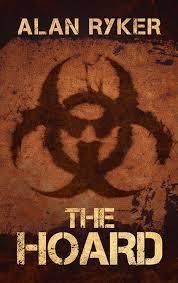Iain Rowan's Blog
January 26, 2014
more news from nowhere is resting
The eagle-eyed amongst you might have noticed that I've not been posting here for a while. I've decided to put it on indefinite hiatus.
If you'd like to see what I'm up to at the moment, check out the links here and follow me on Twitter or via drone or something.
Thanks for reading!
If you'd like to see what I'm up to at the moment, check out the links here and follow me on Twitter or via drone or something.
Thanks for reading!
Published on January 26, 2014 13:25
July 13, 2013
Guest blog - James Everington
James Everington has a new collection of short stories out,
Falling Over
.
Regular readers will know already that I think that James is one of the best new writers out there. His first collection, The Other Room , was the most impressive debut I've read in years.
To mark the launch of Falling Over, James is writing a series of guest blogs about the inspirations and influences on the stories in the collection, and for my blog he's picked a story in Falling Over that I love.
So, over to James...
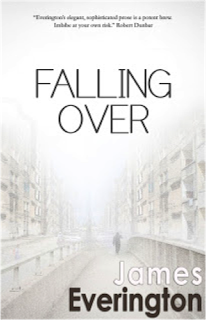
This blog shouldbe about Jack Finney's seminal novel The Body Snatchers and its influence on a story of mine called Falling Over which starts with the sentence:
Ever since Michelle has come back from hospital, I’ve not been sure that it’s really her.
I'm sure the influence of Finney's novel seems obvious...
But, like the central character in Falling Over, I've never actually read The Body Snatchers (it's on my wish-list if anyone is feeling generous?) although I have seen the film adaptations of it, the 70s version being may favourite.
So instead, this blog is about the song Bodysnatchers by Radiohead and its influence on a story of mine called... well you get the idea.
Yes, a song not a story. Can a song be an influence on writing to the same extent as another piece of writing? It must surely be a different type of influence: I've listened to Bodysnatchers far more times than I've read even my favourite Ramsey Campbell short story and my reception of it is also coloured by the other songs on the album, and other songs by Radiohead, interviews with I might have read with the band, and all that jazz.
It's also coloured by the fact that I couldn't swear that I've necessarily heard all the lyrics to the song correctly. Almost certainly not, in fact, given how Thom Yorke sings. (I like the fact that the lyric site I checked before writing this blog just says "incomprehensible" at one point).
So to start: I'm reasonably certain that at one point Thom Yorke sings the lines: I've no idea what I am talking about/I'm trapped in this body and can't get out. And I immediately think about times when I've felt like that, about times when I've felt like an observer in my own body, listening to what I'm apparently saying and thinking I don't believe a word of this!Talking to a stranger maybe, and agreeing with views alien to me just to avoid any conflict. Standing up in the office and giving a presentation full of meaningless corporate speak and nodding my head sagely whilst others do the same.
But what is this part of me behaving in such an odd way? It's the grown up part of me, essentially. The part of me that knows you have to do these things to get a job, to get along, to live. The bodysnatchers are, to me, the compromises we have to make.
Has the light gone out for you/Because the light's gone for me?/It is the 21st century... Typical Radiohead lines, these, sounding both ultra-modern and apocalyptic. I wanted Falling Over to have a similar kind of feel, to capture the feel that late capitalism might be collapsing in on itself but so slowly we do nothing about it. It's not science-fiction as such, but I wanted the world in the background to be just slightly further down the road (or The Road) to environmental depletion than the one around me. But society just carries on, coping with the inflated petrol prices as best it can.
And it occurred to me that the compromises that seemed to inform the idea of the bodysnatchers contained in those first line are exactly the compromises that, on a macro scale, are causing such things. We're all in effect watching the pod-people slowly dirty up our world, but the pod people are us.
I've seen it comingThom Yorke shouts over and over at the end of the song. We can all see it coming.
And yet, like people not quite in control of our own bodies, we do nothing.
-------
Falling Overis published by Infinity Plus and is out now. Ten stories of unease, fear and the weird.
"Good writing gives off fumes, the sort that induce dark visions, and Everington’s elegant, sophisticated prose is a potent brew. Imbibe at your own risk." - Robert Dunbar, author of The Pines and Martyrs & Monsters.
Find out more at Scattershot Writing.
Regular readers will know already that I think that James is one of the best new writers out there. His first collection, The Other Room , was the most impressive debut I've read in years.
To mark the launch of Falling Over, James is writing a series of guest blogs about the inspirations and influences on the stories in the collection, and for my blog he's picked a story in Falling Over that I love.
So, over to James...

This blog shouldbe about Jack Finney's seminal novel The Body Snatchers and its influence on a story of mine called Falling Over which starts with the sentence:
Ever since Michelle has come back from hospital, I’ve not been sure that it’s really her.
I'm sure the influence of Finney's novel seems obvious...
But, like the central character in Falling Over, I've never actually read The Body Snatchers (it's on my wish-list if anyone is feeling generous?) although I have seen the film adaptations of it, the 70s version being may favourite.
So instead, this blog is about the song Bodysnatchers by Radiohead and its influence on a story of mine called... well you get the idea.
Yes, a song not a story. Can a song be an influence on writing to the same extent as another piece of writing? It must surely be a different type of influence: I've listened to Bodysnatchers far more times than I've read even my favourite Ramsey Campbell short story and my reception of it is also coloured by the other songs on the album, and other songs by Radiohead, interviews with I might have read with the band, and all that jazz.
It's also coloured by the fact that I couldn't swear that I've necessarily heard all the lyrics to the song correctly. Almost certainly not, in fact, given how Thom Yorke sings. (I like the fact that the lyric site I checked before writing this blog just says "incomprehensible" at one point).
So to start: I'm reasonably certain that at one point Thom Yorke sings the lines: I've no idea what I am talking about/I'm trapped in this body and can't get out. And I immediately think about times when I've felt like that, about times when I've felt like an observer in my own body, listening to what I'm apparently saying and thinking I don't believe a word of this!Talking to a stranger maybe, and agreeing with views alien to me just to avoid any conflict. Standing up in the office and giving a presentation full of meaningless corporate speak and nodding my head sagely whilst others do the same.
But what is this part of me behaving in such an odd way? It's the grown up part of me, essentially. The part of me that knows you have to do these things to get a job, to get along, to live. The bodysnatchers are, to me, the compromises we have to make.
Has the light gone out for you/Because the light's gone for me?/It is the 21st century... Typical Radiohead lines, these, sounding both ultra-modern and apocalyptic. I wanted Falling Over to have a similar kind of feel, to capture the feel that late capitalism might be collapsing in on itself but so slowly we do nothing about it. It's not science-fiction as such, but I wanted the world in the background to be just slightly further down the road (or The Road) to environmental depletion than the one around me. But society just carries on, coping with the inflated petrol prices as best it can.
And it occurred to me that the compromises that seemed to inform the idea of the bodysnatchers contained in those first line are exactly the compromises that, on a macro scale, are causing such things. We're all in effect watching the pod-people slowly dirty up our world, but the pod people are us.
I've seen it comingThom Yorke shouts over and over at the end of the song. We can all see it coming.
And yet, like people not quite in control of our own bodies, we do nothing.
-------
Falling Overis published by Infinity Plus and is out now. Ten stories of unease, fear and the weird.
"Good writing gives off fumes, the sort that induce dark visions, and Everington’s elegant, sophisticated prose is a potent brew. Imbibe at your own risk." - Robert Dunbar, author of The Pines and Martyrs & Monsters.
Find out more at Scattershot Writing.
Published on July 13, 2013 11:58
May 1, 2013
Writers talk about writing - Aliya Whiteley
Time for a new interview, this time with the very talented Aliya Whiteley. I've enjoyed Aliya's work for a long time, not least because she's turned her hand to a lot of different kinds of stories and executed them all so well. I'm partway through reading her new collection, and it is one of the best things I have read so far this year, and may well stay that way. You should read it, I think you'll love it too. (Get here: Lulu)
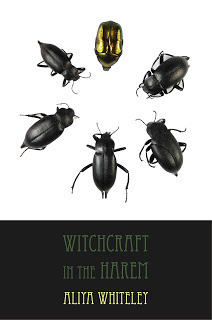 We're in a lift, I'm someone important (come on, pretend), you've got thirty seconds (tall building, slow lift) to tell me about your latest book.
We're in a lift, I'm someone important (come on, pretend), you've got thirty seconds (tall building, slow lift) to tell me about your latest book.I’m stuck in a lift with Cher and you want me to talk books?! I’ll attempt to remain coherent. Witchcraft in the Harem is a collection of fantasy short stories that take you to dangerous and exciting places.
Here’s the blurb:
You’re running away from something terrible. You think you’ve escaped it, this thing, but it turns out it’s waiting for you in all the places you hide: your house, your garden, a self-help group, a seraglio, the island of Zanzibar, a museum in Turin, a hot air balloon in Canada, even in the ladies’ room of your favourite nightclub. You’ve carried it into these places with you. It’s inside you. And now it’s time for it to come out.
I loved Gypsies, Tramps and Thieves, by the way. Will you sign my face please?
Uh-oh. Not sure lifts are meant to stop suddenly between floors like this. Guess we've got a bit more time. Ignore the flickering lights and creaking sounds above us. Would you like to tell me about other books or stories that you have available?
Before I wrote fantasy stories I wrote comic novels. Three Things About Me and Light Readingare still out there for public perusal. And I have the true-life story of the time I fled my wedding (and took my fiancé along with me) available in the bestselling Lonely Planet anthology Better Than Fiction. None of these are as monumental as If I Could Turn Back Time, obviously, but one does one’s best.
Please stop repeatedly pressing the emergency button. The comment about building a ladder of bones to reach the ceiling hatch and get out of here was just blue-skies thinking. So, what are you working on now?
I’ve just finished writing a fantasy novel and I’ve got short stories coming up in magazines like Kaleidotropeand Per Contra, as well in the Best of Smokelong anthology, so these are exciting times for me. Please don’t make a ladder out of me. I have so much to live for.
You've told us about what stories you've written, and I know from my own reading how wide-ranging they are. How would you describe yourself as a writer?
I really don’t do just one genre or type of story. I write the ideas that come to me. I’ve always loved fantasy, but as a loose definition for stories in which anything could happen. I’d describe myself as unpredictable.
Pascal said: "Please forgive this very long and drawn out letter, I did not have time to write you a short one." Do you find writing short fiction harder than your novels?
The challenge of the novel is to keep going every day, and maybe find at the end of the writing process that you’ve wasted a year. I can’t tell early on in a novel if I’m wasting my time, so in that regard a short story is easier to write. Plus my mind works in short. I’m not a person that writes five thousand words and cuts down to two. I write one thousand words and work up. I often find with novels that the scenes I add late on in the editing process become the key moments, which is strange. But my brain works that way.
In your own writing, what do you think you do well, and what do you wish you could do better?
I think I can surprise the reader well. I love those moments when you’re reading a book or a story and you think to yourself – I have no idea where this is going. I love those moments, and I try to get that feeling into my writing. It’s very powerful.
Right now I’m working on a novel from a male point of view, and I’m wishing I was naturally better at that. I’m persevering, though.
Can you remember what made you sit down to write your first book or story?
Compulsory redundancy. I was an assistant at an insurance company and when they decided to close the office they needed someone to stay behind for three months and sit there with not a lot to do until all the furniture had been moved out. So I filled my time by writing. I wrote a really awful romantic novel, just to see if I could. And I could. That gave me the confidence to try to write something literary, and I wrote my King Lear/Dune crossover novella, Mean Mode Median. And I loved it – that feeling of creation and freedom.
Do you have a book or short story that you're very fond of, but you think should get more attention from the world than it has?
I wrote a novel a few years ago called The Flipside of Libby Frost and it is an Acker Bilk inspired weirdness of a novel that I’m very proud of. But it fell in that period when conventional publishing wanted me to write something a bit more commercial and so it never got published. Maybe someday it’ll make it out of the hard drive and into the real world.
Print publishing is a doomed but still predatory dinosaur rotting from the feet up. Ebook publishing is the vomiting out of the world's slushpiles onto the market. In the ongoing war of words and hyperbole, where's the happy medium to be found? Where do you think the publishing business is heading over the next few years, and what are you doing to be ready for it?
I really don’t know and I’m rubbish at predicting things. My experiences with larger publishers and the business model of publishing has taught me that I can’t do anything about it. I want to get my work out there and beyond that I am unbothered about the medium. I’ve done big publishing, small press, and self-publishing, and they all have something to recommend them. No matter how I get published, the only thing under my control is putting my best work out there so that I’m not ashamed of it. So that’s what I concentrate on.
What book do you most wish that you had written?
Rupert Thomson’s The Book of Revelation. Anything by Rupert Thomson, actually, because he’s brilliant. Or The Heart of the Matter by Graham Greene.
If you could give an aspiring writer one piece of advice, what would it be?
You only start to get good at it if you do it lots and do it for years.
If you could tell an aspiring piece of writer to ignore one commonly given piece of advice, what would it be?
Any reductive piece of advice annoys me. Don’t use adverbs, don’t use tags other than ‘said’, and so on. You get a feel for what fits after a while, and sometimes it’s an adverb or a different speech tag. She opined grandiosely.
Are you 'out' as a writer of fiction with work colleagues/family, and if so, what reaction did you get?
I was a full-time stay-home mother, but then my daughter ungraciously went off to school, so I had to come clean and admit I had also been writing for the past five years and wasn’t about to go out and get another office job.
It’s difficult to hide because I like writing in cafes. In fact, I choose one café that I love and I go there every morning, and so it would look odd to say I’m merely doodling when I’m obviously scribbling long sentences for two hours at a time. So I tell people I’m a writer, and they think I’m strange or deluded, and that’s fine. They’re always really pleased for me, though. Pleased that I’m happily scribbling away.
Gibbons or tigers?
I just wrote a short story about tigers that live in your brain, so tigers it is.
Published on May 01, 2013 16:30
March 28, 2013
Storytime
Am not writing much in the way of short fiction these days (it's all novel novel novel and will be for the foreseeable), but the new issue of Supernatural Tales includes a story from me, a story from the excellent James Everington, and five other great stories. Full contents:
'The Singing' - Iain Rowan
'Ilona' - Tina Rath
'A Moment of Your Time' - Katherine Haynes
'Screech' - Gemma Farrow
'Last Testament' - Craig D.B. Patton
'The Second Wish' - James Everington
'The Tempest Glass' - Daniel Mills
Get it in print or digital format here.
'The Singing' - Iain Rowan
'Ilona' - Tina Rath
'A Moment of Your Time' - Katherine Haynes
'Screech' - Gemma Farrow
'Last Testament' - Craig D.B. Patton
'The Second Wish' - James Everington
'The Tempest Glass' - Daniel Mills
Get it in print or digital format here.
Published on March 28, 2013 13:13
March 24, 2013
Cyclones, hurricanes, and turbulence
So...Tracy and I have signed up to do the Cyclone Challenge in June.
100km from Newcastle up into the hills of Northumberland and back again. Looks like there is the occasional hill, but we're not going into the Cheviots. Plan is that after not too long we will be going much further than this, but it seems a good start.
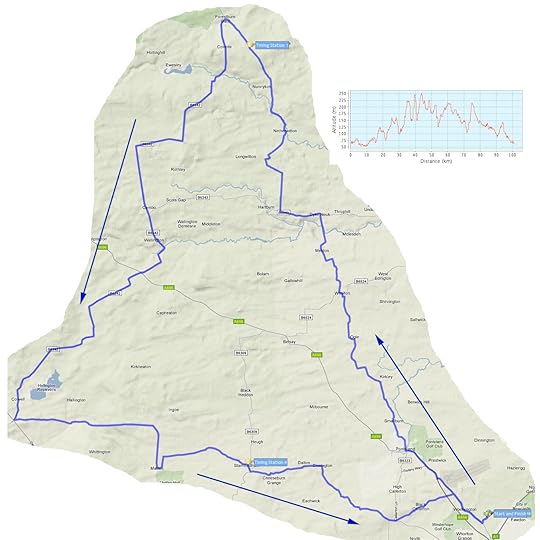
Unlike training, which has been not happening this windswept weekend. When a whole bunch of lampposts are being blown over along our usual loop, that's nature's way of telling you it's not the brightest idea to be out on the bike.
So, for these prolonged wintry moments, we bought a turbo trainer today. If you don't know what that is, it's kind of a mix of these.
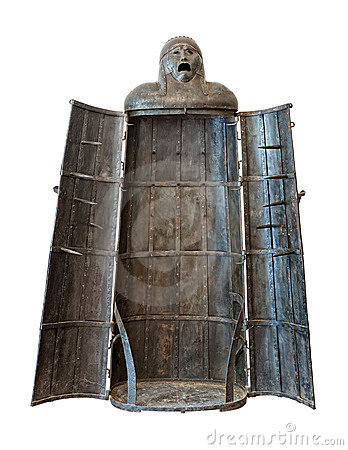
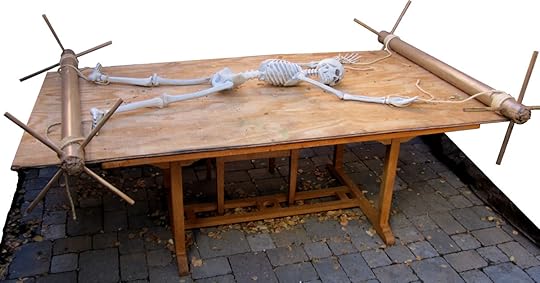
100km from Newcastle up into the hills of Northumberland and back again. Looks like there is the occasional hill, but we're not going into the Cheviots. Plan is that after not too long we will be going much further than this, but it seems a good start.

Unlike training, which has been not happening this windswept weekend. When a whole bunch of lampposts are being blown over along our usual loop, that's nature's way of telling you it's not the brightest idea to be out on the bike.
So, for these prolonged wintry moments, we bought a turbo trainer today. If you don't know what that is, it's kind of a mix of these.


Published on March 24, 2013 14:29
February 24, 2013
Eleven Facts, Eleven Questions, Eleven People
It's been very quiet here, hasn't it?
I have spent a lot of January and February working very hard on a new novel, working very hard at proper pays-the-bills work, and sticking two fingers up at the weather by riding (and occasionally falling off) my bike. Bikes. Accidentally bought another one. Loving it though, and becoming just a touch obsessive. I blame my wife's bad influence.
Am excited about the new novel, which is called Going Under and is about being undercover and losing grip on who you really are. Also, drowning, the protest movement, corporate espionage, the arms trade, blackmail, and everyone, but everyone, being undercover in their own furtive way.
Early days yet, but is shaping up nicely.
I so often don't get round to doing these things, but this one I have, thanks to a prompt from James Everington. You have to give eleven facts about yourself, answer eleven questions set by the person who's prompted you, then set another eleven questions for eleven more people. Eventually everyone in the world answers it and then the world ends, or something.
So, eleven facts, all of which are true, because they would be a lot more interesting if they weren't.
1. I have bled an awful lot in a Roman sewer.2. When I was little I covered part of the Kent countryside in posters claiming to be from smugglers and threatening doom if people gave us away to the Revenue. I was a weird kid.3. I tried very hard to get REM to come and play an impromptu free acoustic gig when they were on tour here, and their manager was very nice but said sorry, they need the night off as it's a busy tour.4. Bjork once told me to fuck off.5. I nearly broke my ankle once when I walked out of a bar and into an orc. Or someone dressed as an orc. I dunno. It was late. I was impaired. They had horns on their hat.6. I spent most of my adult life believing that Arkansas was pronounced Ah-kansas.7. I fell off my bike today, and badly bruised my ego.8. I once dressed in a vulture suit and sang Heartbreak Hotel, night after night after night.9. I once had a summer job as a door to door salesman, selling book club memberships. In my week's probation, I sold one. And she sold door to door and felt sorry for me. I agreed with my employer that my skills lay elsewhere, and that telling people they'd be better off just buying the books they wanted from a bookshop probably was a sackable offence.10. Stephen Hawking once scared the shit out of me in a dark and lonely place.11. My cat appears to be doubling in size on a weekly basis.
And James' questions for me:
Who’s the most underrated author out there that you know of?
Rupert Thomson, who has a new book out very shortly (‘Secrecy’, 7th March) which sounds all kinds of interesting.
You need to pick one song to be used to torture unpleasant terrorist types, by playing it to them full volume 24/7. What do you pick?
The background music on the Rice Krisipies advert, the one with a man singing ‘snap, crackle, pop, cray, crazy world we live in’ in a Noel Coward stylee. I would confess to anything after about ten seconds of that. I’m getting angry and upset just writing about it.
As a writer, what is your own personal definition of success?
Having sat down and written. All else follows, or doesn’t, who knows.
How do you like your steak?
Not from anything which has a realistic chance of competing in a steeplechase.
A genie grants you get an extra hour every day, meaning your days are 25 hours long. The condition is you must use this hour to take up a brand new hobby. What do you pick?
I’ve always wanted to learn to play the drums but only time has got in my way. Well, time, and a staggering lack of being able to co-ordinate doing four different things at once. Doing one is often a considerable challenge.
What’s the most overrated piece of writing advice you’ve ever been given?
Write what you know.
What a dull, dull world it would be if everyone did that.
If you were in a band, what would your band name be?
I was once, a long time ago and to very minor effect, and we were called Somewhere Else, which I still think is a good band name. I do have a current ‘if I had a band they would be called this name’ which came out in idle conversation, but there’s no way I’m posting that one on the internet.
Oxford Commas – yes or no?
I’m with Vampire Weekend on this one.
What’s the most embarrassing typo or mistake you’ve ever found in your work after publication?
The plot.
Who’s your favourite Muppet?
Two, for me. Stadler and Waldorf. Because the older I get, the more reasonable they seem.
Will you write me a haiku?
Write you a haiku?Frog leaps into pond and saysNah.
And now, my eleven for eleven to the following good people, who can take it or leave it as the fancy takes them: Keith Brooke, Julie Lewthwaite, Paul D Brazil, Chris Rhatigan, Darren Sant, Neil Williamson, Aliya Whiteley, Charlie Williams, Col Bury, Tim Kimbirk, Ian Ayris
1. What is the single thing you are most proud of having written?2. If your latest novel or story had a soundtrack by one artist, who would that be?3. Flight, or invisibility? Choose one.4. Have you ever secretly based one of your characters on a real-life person, just so you can kill them off?5. Do you get more upset when one animal is harmed in a film than a hundred people?6. What's the worst film version of a good novel that you have ever seen, and why?7. What is the single thing that scares you more than anything else? I don't mean the essential futility of life, fragility of family and all the real things, I mean the embarrassing thing that still completely creeps you out? My wife has repeatedly run into a clown collecting money recently, and that is a very good example. 8. What's the one book that you wished you had written?9. If you owned some variety of sports team, and had to design your own strip, what would it be like?10. A choice: big money and sales as a ghost writer, or cult figure but poor under your own name?11. Dolphin or manatee?
Published on February 24, 2013 10:04
December 30, 2012
52 Songs...53 Stories - closedown
The fifty-second and last week of 52 Songs, 52 Stories. Which, due to the vagaries of the calendar, and my timing, turns out to be 53 stories. The fifty-third, and last, story: Closedown. It's been a slog at times, when inspiration has seemed very far away, and a lot else has been going on, but I am pleased that I stuck with it to the end.
Thank you very much for reading, those who have followed it throughout 2012.
The complete list of stories/songs:
Why Don't You Kill Yourself (The Only Ones)
Never Tell (Violent Femmes)
Sexyback (Justin Timberlake)
Psychokiller (Talking Heads)
Love Songs On The Radio (Mojave 3)
Caught By The River (The Doves)
Brave Bulging Buoyant Clairvoyants (Wild Beasts)
Sabotage (Beastie Boys)
Waiting For The Man (Velvet Underground)
These Days (Nico)
Come Inside (My Bloody Valentine)
4' 33" (John Cage)
Poems (Tricky)
The Grey Ship (EMA)
Way Down In The Hole (Tom Waits)
Invocation (...And You Will Know Us By The Trail Of Dead)
Angel (Massive Attack)
We're No Here (Mogwai)
Lucky You (The National)
Everything Trying (Damien Jurado)
Wolf Like Me (TV On The Radio)
Sad and Beautiful World (Sparklehorse)
Walk Away (Sisters Of Mercy)
Jimmy James (Beastie Boys)
Feeling Yourself Disintegrate (The Flaming Lips)
Someday I Will Treat You Good (Sparklehorse)
Keep On Knocking (Death)
TV Eye (The Stooges)
Elephant Gun (Beirut)
Admiral (King Creosote)
I See A Darkness (Johnny Cash)
Clandestin (Fatoumata Diawara)
The Boy Done Wrong Again (Belle and Sebastian)
Don't Ask Me To Dance (Arab Strap)
What We Gained In The Fire (The Mynabirds)
Four Ton Mantis (Amon Tobin)
A Grand Love Theme (Kid Loco)
Police And Thieves (Junior Murvin)
Seventeen Seconds (The Cure)
The Piano (PJ Harvey)
My Autumn's Done Come (Lee Hazlewood)
Blackout (Anna Calvi)
Come In Alone (My Bloody Valentine)
The Beast (The Only Ones)
Feathers and Down (The Cardigans)
Coward (Vic Chesnutt)
The Dead Part Of You (American Music Club)
Twins (Gem Club)
The Drowning Man (The Cure)
Daft Punk Are Playing At My House (LCD Soundsystem)
Hell Is Round The Corner (Tricky)
Beginning Of A Great Adventure (Lou Reed)
Closedown (The Cure)
Thank you very much for reading, those who have followed it throughout 2012.
The complete list of stories/songs:
Why Don't You Kill Yourself (The Only Ones)
Never Tell (Violent Femmes)
Sexyback (Justin Timberlake)
Psychokiller (Talking Heads)
Love Songs On The Radio (Mojave 3)
Caught By The River (The Doves)
Brave Bulging Buoyant Clairvoyants (Wild Beasts)
Sabotage (Beastie Boys)
Waiting For The Man (Velvet Underground)
These Days (Nico)
Come Inside (My Bloody Valentine)
4' 33" (John Cage)
Poems (Tricky)
The Grey Ship (EMA)
Way Down In The Hole (Tom Waits)
Invocation (...And You Will Know Us By The Trail Of Dead)
Angel (Massive Attack)
We're No Here (Mogwai)
Lucky You (The National)
Everything Trying (Damien Jurado)
Wolf Like Me (TV On The Radio)
Sad and Beautiful World (Sparklehorse)
Walk Away (Sisters Of Mercy)
Jimmy James (Beastie Boys)
Feeling Yourself Disintegrate (The Flaming Lips)
Someday I Will Treat You Good (Sparklehorse)
Keep On Knocking (Death)
TV Eye (The Stooges)
Elephant Gun (Beirut)
Admiral (King Creosote)
I See A Darkness (Johnny Cash)
Clandestin (Fatoumata Diawara)
The Boy Done Wrong Again (Belle and Sebastian)
Don't Ask Me To Dance (Arab Strap)
What We Gained In The Fire (The Mynabirds)
Four Ton Mantis (Amon Tobin)
A Grand Love Theme (Kid Loco)
Police And Thieves (Junior Murvin)
Seventeen Seconds (The Cure)
The Piano (PJ Harvey)
My Autumn's Done Come (Lee Hazlewood)
Blackout (Anna Calvi)
Come In Alone (My Bloody Valentine)
The Beast (The Only Ones)
Feathers and Down (The Cardigans)
Coward (Vic Chesnutt)
The Dead Part Of You (American Music Club)
Twins (Gem Club)
The Drowning Man (The Cure)
Daft Punk Are Playing At My House (LCD Soundsystem)
Hell Is Round The Corner (Tricky)
Beginning Of A Great Adventure (Lou Reed)
Closedown (The Cure)
Published on December 30, 2012 09:13
December 16, 2012
Writers Talk About Writing - Leigh Russell
It's been a while since I've posted my series of author interviews here.
So let's put that right, with an interview with Leigh Russell, author of a bestselling series of crime novels featuring Detective Inspector Geraldine Steel. Barry Forshaw, the UK’s leading expert on crime fiction, says Leigh’s books “take the reader into the darkest recesses of the human psyche” although Leigh claims she has never killed anyone.
I've linked to the Amazon UK versions of all of Leigh's books (apart from STOP DEAD, which is out later this month), but you can find links to other versions, audiobooks, large print versions and more at Leigh's website.
Now, on with the interview.
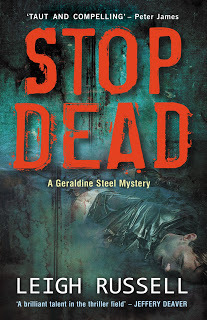 We're in a lift, I'm someone important (come on, pretend), you've got thirty seconds (tall building, slow lift) to tell me about your latest book.
We're in a lift, I'm someone important (come on, pretend), you've got thirty seconds (tall building, slow lift) to tell me about your latest book.
STOP DEAD is the second of the London novels in the Geraldine Steel series. Once again the reader follows Geraldine Steel’s search for a killer who proves to be elusive as well as deadly. The only clues the police have to the killer’s identity are two samples of DNA found at the crime scenes. The first of these matches the DNA of a woman who has been in prison for twenty years, the second is from a woman who has been dead for two years. This makes no sense, but Geraldine has to solve the mystery if she is to find the killer who has embarked on a killing spree. STOP DEAD is available to download from 21st December, and will be out in print in 2013.
Uh-oh. Not sure lifts are meant to stop suddenly between floors like this. Guess we've got a bit more time. Ignore the flickering lights and creaking sounds above us. Would you like to tell me about other books or stories that you have available?
The first three books in the series are set in Kent. CUT SHORT was shortlisted for a CWA Dagger Award for Best First Novel, ROAD CLOSED was chosen as a Top Read on Eurocrime, and DEAD END was voted Best Crime Novel of 2011 by readers in a poll on Crime Time. In DEATH BED my detective relocates to London. In each of the books she is struggling to track down a killer.
Please stop repeatedly pressing the emergency button. The comment about building a ladder of bones to reach the ceiling hatch and get out of here was just blue-skies thinking. So, what are you working on now?
Initially my publisher offered me a three book deal for the Geraldine Steel series. Those three books all went on to become international bestsellers so my publisher signed me up for another three books in the series. STOP DEAD is the fifth, so I’m currently working on the sixth. I’m meeting my publisher in a few weeks’ time to discuss our next contract and I’m hoping he’ll ask for three more Geraldine Steel novels. If he doesn’t… I know where he lives (cue evil laughter)
You have taught a course on crime fiction to your students. If you had to pick just five books to put on a set text list, what would they be and why?
CUT SHORT, ROAD CLOSED, DEAD END, DEATH BED and STOP DEAD – because I would be able to share something about the process of writing the series, which they might find interesting. At the moment we are looking at Ian Rankin, Simon Beckett, and Alexander McCall Smith, which offer a wide range of settings and styles. Last year I used Wilkie Collins, Conan Doyle and Ian Rankin, looking at the development of crime fiction since the nineteenth century.
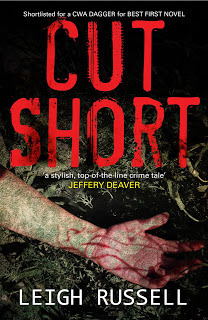 You've written a long-running series with your Geraldine Steel books. Do you ever feel constrained by her when you are writing, or will you be sad to someday let her go?
You've written a long-running series with your Geraldine Steel books. Do you ever feel constrained by her when you are writing, or will you be sad to someday let her go?
Before I started, I would have thought it was easier to write from the point of view of a detective than a killer. The opposite proved to be the case when I was writing my debut, CUT SHORT. My detective has to behave in a way that readers find credible. I have a lot of fans on the police force, and try to make her as authentic as possible in her professional as well as her private life. So I did feel constrained by her when I started writing. With my killers on the other hand, I have always been able to allow my imagination free rein. As the series has gone on, I have got to know Geraldine and it will certainly be strange when the series comes to an end and I have to let her go. But there is still a way to go before then, as my plan is to write twenty books in the Geraldine Steel series.
One of your secondary characters has taken centre stage, and may well be starring in a series of his own. Can you tell us a little more about him?
Ian Peterson is a character I have liked from his first appearance in CUT SHORT. Like Geraldine, I’ve tried to make him fairly normal, the kind of bloke everyone would know or be able to relate to. I tend to save the peculiar quirks of character for my minor characters, and my killers. As Geraldine’s supporting sergeant, Ian Peterson has become quite a popular character in his own right so I’m currently exploring the possibility of a spin off series with him as the protagonist.
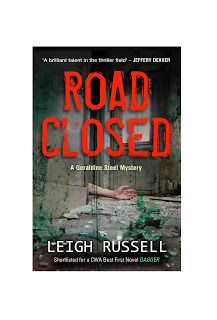 In your own writing, what do you think you do well, and what do you wish you could do better?
In your own writing, what do you think you do well, and what do you wish you could do better?
It’s not for me to say whether I do this well, but I enjoy creating characters. The Times critic, Marcel Berlins, described my writing as “psychologically acute” and Peter James wrote that STOP DEAD has “a deeply human voice”. Barry Forshaw said that my books “take the reader into the darkest recesses of the human psyche.” I’m not quite sure how I get there!
There are lots of things I wish I could do better – everything in fact! Location is probably my weakest point. In DEAD END my detective moves around the country and the scenes described are as far apart as Whitstable and Scarborough. In DEATH BED, real locations in North London are described. I worked quite hard to show those locations to my readers.
Can you remember what made you sit down to write your first book or story?
Yes. CUT SHORT grew out of an idea that occurred to me while walking through my local park. It was a rainy day and the park was deserted. There is a tangled copse of trees and shrubs on one side of the path, opposite a children’s playground. As I approached the trees, a man appeared around a bend in the path, walking towards me. I wondered what I would do if I walked on and saw a body in the bushes. Afterwards I would be able to identify the man who had been there in the park, the man who had killed a woman and left her body in the bushes. I walked on, and of course there was no body in the bushes, but the idea stayed with me and when I got home I began to write the story down. That turned into the first draft for CUT SHORT which went on to be shortlisted for a CWA Dagger Award for Best First Novel.
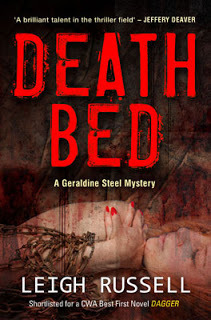 Print publishing is a doomed but still predatory dinosaur rotting from the feet up. Ebook publishing is the vomiting out of the world's slushpiles onto the market. In the ongoing war of words and hyperbole, where's the happy medium to be found? Where do you think the publishing business is heading over the next few years, and what are you doing to be ready for it?
Print publishing is a doomed but still predatory dinosaur rotting from the feet up. Ebook publishing is the vomiting out of the world's slushpiles onto the market. In the ongoing war of words and hyperbole, where's the happy medium to be found? Where do you think the publishing business is heading over the next few years, and what are you doing to be ready for it?
Sales of e-books have overtaken sales of print books in the UK this year. It took 4 years for that to happen in the US. Here in the UK it has taken just 2 years. Even Waterstones, our largest remaining bookshop chain, is aggressively marketing kindles instead of championing print books. Not that there’s anything wrong with e-readers. On the contrary, they seem to be encouraging people to read more. There’s a place for both e-books and print books, and as long as people are reading, the medium doesn’t really matter. My only concern is that if too few people buy print books, they will stop being financially viable. Books, bookshops, libraries and publishers will disappear. There is no question the publishing world is changing very fast, and it’s difficult to predict where it will be a year from now.
What book do you most wish that you had written?
There are too many to list! To Kill a Mockingbird, Pride and Prejudice, Wuthering Heights, The Remains of the Day, 1984… the list is endless.
What is it that really pushes your buttons as a reader?
It’s character for me every time. If I don’t care about the characters in a book although I may still enjoy the story, it won’t really grip me.
If you could give an aspiring writer one piece of advice, what would it be?
Write for its own sake. Being published is very exciting and gratifying, but the real buzz is writing. If you write just because you want to be offered a publishing deal, you are likely to be disappointed.
If you could tell an aspiring piece of writer to ignore one commonly given piece of advice, what would it be?
‘Write what you know’ always strikes me as very limiting. It hardly makes sense, unless the phrase was dreamed up by someone who writes non-fiction. What’s wrong with imagining events and settings? Isn’t that the definition of fiction? I don’t suppose JK Rowling has personal experience of riding on a broomstick, any more than I have experienced what it feels like to kill someone.
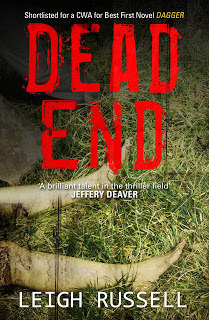 Are you 'out' as a writer of fiction with work colleagues/family, and if so, what reaction did you get?
Are you 'out' as a writer of fiction with work colleagues/family, and if so, what reaction did you get?
To begin with I kept fairly quiet about my writing but as the series has become so successful, it has become impossible to conceal, even though I write under a pseudonym. The reaction has been very supportive and positive, and there still seems to be a lot of kudos attached to being a traditionally published author.
Meticulous research is both enjoyable and important / what's the point in writing fiction if you can't just make stuff up - discuss.
I try to make my books believable as I think that makes them more frightening. This involves a lot of research, if the stories are going to seem authentic. With this in mind, I consult a host of people including police officers, fire officers, and medical and forensic experts. I’ve spent time with a murder investigation team and a team of firemen, and taken advice from many police officers, a professor of forensic medicine, the human remains department at the National History Museum… the list goes on…. At the same time my plots and characters are all fictitious and I have fun making stuff up.
People who are shortlisted for a CWA Dagger are just the nicest people, aren't they?
I’m not going to argue with that! Thank you very much for interviewing me here.
So let's put that right, with an interview with Leigh Russell, author of a bestselling series of crime novels featuring Detective Inspector Geraldine Steel. Barry Forshaw, the UK’s leading expert on crime fiction, says Leigh’s books “take the reader into the darkest recesses of the human psyche” although Leigh claims she has never killed anyone.
I've linked to the Amazon UK versions of all of Leigh's books (apart from STOP DEAD, which is out later this month), but you can find links to other versions, audiobooks, large print versions and more at Leigh's website.
Now, on with the interview.
 We're in a lift, I'm someone important (come on, pretend), you've got thirty seconds (tall building, slow lift) to tell me about your latest book.
We're in a lift, I'm someone important (come on, pretend), you've got thirty seconds (tall building, slow lift) to tell me about your latest book.STOP DEAD is the second of the London novels in the Geraldine Steel series. Once again the reader follows Geraldine Steel’s search for a killer who proves to be elusive as well as deadly. The only clues the police have to the killer’s identity are two samples of DNA found at the crime scenes. The first of these matches the DNA of a woman who has been in prison for twenty years, the second is from a woman who has been dead for two years. This makes no sense, but Geraldine has to solve the mystery if she is to find the killer who has embarked on a killing spree. STOP DEAD is available to download from 21st December, and will be out in print in 2013.
Uh-oh. Not sure lifts are meant to stop suddenly between floors like this. Guess we've got a bit more time. Ignore the flickering lights and creaking sounds above us. Would you like to tell me about other books or stories that you have available?
The first three books in the series are set in Kent. CUT SHORT was shortlisted for a CWA Dagger Award for Best First Novel, ROAD CLOSED was chosen as a Top Read on Eurocrime, and DEAD END was voted Best Crime Novel of 2011 by readers in a poll on Crime Time. In DEATH BED my detective relocates to London. In each of the books she is struggling to track down a killer.
Please stop repeatedly pressing the emergency button. The comment about building a ladder of bones to reach the ceiling hatch and get out of here was just blue-skies thinking. So, what are you working on now?
Initially my publisher offered me a three book deal for the Geraldine Steel series. Those three books all went on to become international bestsellers so my publisher signed me up for another three books in the series. STOP DEAD is the fifth, so I’m currently working on the sixth. I’m meeting my publisher in a few weeks’ time to discuss our next contract and I’m hoping he’ll ask for three more Geraldine Steel novels. If he doesn’t… I know where he lives (cue evil laughter)
You have taught a course on crime fiction to your students. If you had to pick just five books to put on a set text list, what would they be and why?
CUT SHORT, ROAD CLOSED, DEAD END, DEATH BED and STOP DEAD – because I would be able to share something about the process of writing the series, which they might find interesting. At the moment we are looking at Ian Rankin, Simon Beckett, and Alexander McCall Smith, which offer a wide range of settings and styles. Last year I used Wilkie Collins, Conan Doyle and Ian Rankin, looking at the development of crime fiction since the nineteenth century.
 You've written a long-running series with your Geraldine Steel books. Do you ever feel constrained by her when you are writing, or will you be sad to someday let her go?
You've written a long-running series with your Geraldine Steel books. Do you ever feel constrained by her when you are writing, or will you be sad to someday let her go?Before I started, I would have thought it was easier to write from the point of view of a detective than a killer. The opposite proved to be the case when I was writing my debut, CUT SHORT. My detective has to behave in a way that readers find credible. I have a lot of fans on the police force, and try to make her as authentic as possible in her professional as well as her private life. So I did feel constrained by her when I started writing. With my killers on the other hand, I have always been able to allow my imagination free rein. As the series has gone on, I have got to know Geraldine and it will certainly be strange when the series comes to an end and I have to let her go. But there is still a way to go before then, as my plan is to write twenty books in the Geraldine Steel series.
One of your secondary characters has taken centre stage, and may well be starring in a series of his own. Can you tell us a little more about him?
Ian Peterson is a character I have liked from his first appearance in CUT SHORT. Like Geraldine, I’ve tried to make him fairly normal, the kind of bloke everyone would know or be able to relate to. I tend to save the peculiar quirks of character for my minor characters, and my killers. As Geraldine’s supporting sergeant, Ian Peterson has become quite a popular character in his own right so I’m currently exploring the possibility of a spin off series with him as the protagonist.
 In your own writing, what do you think you do well, and what do you wish you could do better?
In your own writing, what do you think you do well, and what do you wish you could do better? It’s not for me to say whether I do this well, but I enjoy creating characters. The Times critic, Marcel Berlins, described my writing as “psychologically acute” and Peter James wrote that STOP DEAD has “a deeply human voice”. Barry Forshaw said that my books “take the reader into the darkest recesses of the human psyche.” I’m not quite sure how I get there!
There are lots of things I wish I could do better – everything in fact! Location is probably my weakest point. In DEAD END my detective moves around the country and the scenes described are as far apart as Whitstable and Scarborough. In DEATH BED, real locations in North London are described. I worked quite hard to show those locations to my readers.
Can you remember what made you sit down to write your first book or story?
Yes. CUT SHORT grew out of an idea that occurred to me while walking through my local park. It was a rainy day and the park was deserted. There is a tangled copse of trees and shrubs on one side of the path, opposite a children’s playground. As I approached the trees, a man appeared around a bend in the path, walking towards me. I wondered what I would do if I walked on and saw a body in the bushes. Afterwards I would be able to identify the man who had been there in the park, the man who had killed a woman and left her body in the bushes. I walked on, and of course there was no body in the bushes, but the idea stayed with me and when I got home I began to write the story down. That turned into the first draft for CUT SHORT which went on to be shortlisted for a CWA Dagger Award for Best First Novel.
 Print publishing is a doomed but still predatory dinosaur rotting from the feet up. Ebook publishing is the vomiting out of the world's slushpiles onto the market. In the ongoing war of words and hyperbole, where's the happy medium to be found? Where do you think the publishing business is heading over the next few years, and what are you doing to be ready for it?
Print publishing is a doomed but still predatory dinosaur rotting from the feet up. Ebook publishing is the vomiting out of the world's slushpiles onto the market. In the ongoing war of words and hyperbole, where's the happy medium to be found? Where do you think the publishing business is heading over the next few years, and what are you doing to be ready for it?Sales of e-books have overtaken sales of print books in the UK this year. It took 4 years for that to happen in the US. Here in the UK it has taken just 2 years. Even Waterstones, our largest remaining bookshop chain, is aggressively marketing kindles instead of championing print books. Not that there’s anything wrong with e-readers. On the contrary, they seem to be encouraging people to read more. There’s a place for both e-books and print books, and as long as people are reading, the medium doesn’t really matter. My only concern is that if too few people buy print books, they will stop being financially viable. Books, bookshops, libraries and publishers will disappear. There is no question the publishing world is changing very fast, and it’s difficult to predict where it will be a year from now.
What book do you most wish that you had written?
There are too many to list! To Kill a Mockingbird, Pride and Prejudice, Wuthering Heights, The Remains of the Day, 1984… the list is endless.
What is it that really pushes your buttons as a reader?
It’s character for me every time. If I don’t care about the characters in a book although I may still enjoy the story, it won’t really grip me.
If you could give an aspiring writer one piece of advice, what would it be?
Write for its own sake. Being published is very exciting and gratifying, but the real buzz is writing. If you write just because you want to be offered a publishing deal, you are likely to be disappointed.
If you could tell an aspiring piece of writer to ignore one commonly given piece of advice, what would it be?
‘Write what you know’ always strikes me as very limiting. It hardly makes sense, unless the phrase was dreamed up by someone who writes non-fiction. What’s wrong with imagining events and settings? Isn’t that the definition of fiction? I don’t suppose JK Rowling has personal experience of riding on a broomstick, any more than I have experienced what it feels like to kill someone.
 Are you 'out' as a writer of fiction with work colleagues/family, and if so, what reaction did you get?
Are you 'out' as a writer of fiction with work colleagues/family, and if so, what reaction did you get?To begin with I kept fairly quiet about my writing but as the series has become so successful, it has become impossible to conceal, even though I write under a pseudonym. The reaction has been very supportive and positive, and there still seems to be a lot of kudos attached to being a traditionally published author.
Meticulous research is both enjoyable and important / what's the point in writing fiction if you can't just make stuff up - discuss.
I try to make my books believable as I think that makes them more frightening. This involves a lot of research, if the stories are going to seem authentic. With this in mind, I consult a host of people including police officers, fire officers, and medical and forensic experts. I’ve spent time with a murder investigation team and a team of firemen, and taken advice from many police officers, a professor of forensic medicine, the human remains department at the National History Museum… the list goes on…. At the same time my plots and characters are all fictitious and I have fun making stuff up.
People who are shortlisted for a CWA Dagger are just the nicest people, aren't they?
I’m not going to argue with that! Thank you very much for interviewing me here.
Published on December 16, 2012 13:18
November 18, 2012
Instant gratification
Bought it yesterday. Can't have it for five weeks. My inner child has a pet lip so large it's a trip hazard.
Still, isn't she lovely.
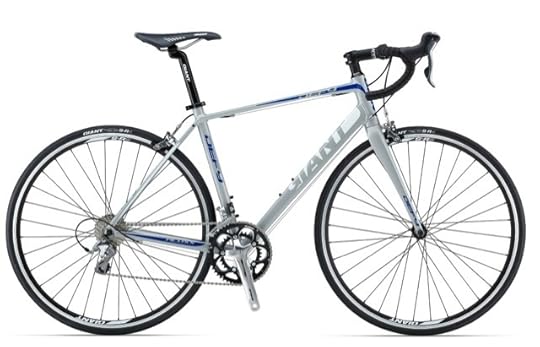
Still, isn't she lovely.

Published on November 18, 2012 12:23

